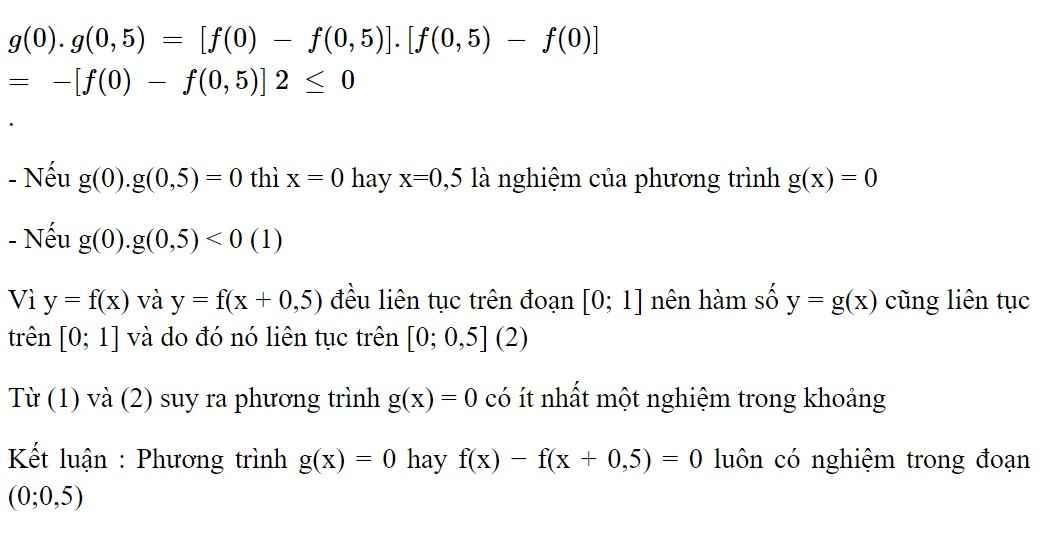Hãy nhập câu hỏi của bạn vào đây, nếu là tài khoản VIP, bạn sẽ được ưu tiên trả lời.

Chứng minh các biểu thức đã cho không phụ thuộc vào x.
Từ đó suy ra f'(x)=0
a) f(x)=1⇒f′(x)=0f(x)=1⇒f′(x)=0 ;
b) f(x)=1⇒f′(x)=0f(x)=1⇒f′(x)=0 ;
c) f(x)=\(\frac{1}{4}\)(\(\sqrt{2}\)-\(\sqrt{6}\))=>f'(x)=0
d,f(x)=\(\frac{3}{2}\)=>f'(x)=0

a) f'(x) = - 3sinx + 4cosx + 5. Do đó
f'(x) = 0 <=> - 3sinx + 4cosx + 5 = 0 <=> 3sinx - 4cosx = 5
<=> sinx -
cosx = 1. (1)
Đặt cos φ = , (φ ∈
) => sin φ =
, ta có:
(1) <=> sinx.cos φ - cosx.sin φ = 1 <=> sin(x - φ) = 1
<=> x - φ = + k2π <=> x = φ +
+ k2π, k ∈ Z.
b) f'(x) = - cos(π + x) - sin = cosx + sin
.
f'(x) = 0 <=> cosx + sin = 0 <=> sin
= - cosx <=> sin
= sin
<=> =
+ k2π hoặc
= π - x +
+ k2π
<=> x = π - k4π hoặc x = π + k, (k ∈ Z).

Tham khảo:
Xét hàm số g(x) = f(x) − f(x + 0,5)
Ta có
g(0) = f(0) − f(0 + 0,5) = f(0) − f(0,5)
g(0,5) = f(0,5) − f(0,5 + 0,5) = f(0,5) − f(1) = f(0,5) − f(0)
(vì theo giả thiết f(0) = f(1)).
Do đó,


Lời giải:
a) Ta có f'(x) = 3x2 + 1, g(x) = 6x + 1. Do đó
f'(x) > g'(x) <=> 3x2 + 1 > 6x + 1 <=> 3x2 - 6x >0
<=> 3x(x - 2) > 0 <=> x > 2 hoặc x > 0 <=> x ∈ (-∞;0) ∪ (2;+∞).
b) Ta có f'(x) = 6x2 - 2x, g'(x) = 3x2 + x. Do đó
f'(x) > g'(x) <=> 6x2 - 2x > 3x2 + x <=> 3x2 - 3x > 0
<=> 3x(x - 1) > 0 <=> x > 1 hoặc x < 0 <=> x ∈ (-∞;0) ∪ (1;+∞).

a/ \(\lim\limits_{x\rightarrow\sqrt{2}}f\left(x\right)=\lim\limits_{x\rightarrow\sqrt{2}}\frac{\left(x-\sqrt{2}\right)\left(x+\sqrt{2}\right)}{x-\sqrt{2}}=\lim\limits_{x\rightarrow\sqrt{2}}\left(x+\sqrt{2}\right)=2\sqrt{2}\)
\(\Rightarrow\lim\limits_{x\rightarrow\sqrt{2}}f\left(x\right)=f\left(\sqrt{2}\right)\Rightarrow\) hàm số liên tục tại \(x=\sqrt{2}\)
b/ \(\lim\limits_{x\rightarrow5^+}f\left(x\right)=\lim\limits_{x\rightarrow5^+}\frac{x-5}{\sqrt{2x-1}-3}=\frac{\left(x-5\right)\left(\sqrt{2x-1}+3\right)}{2\left(x-5\right)}=\lim\limits_{x\rightarrow5^+}\frac{\sqrt{2x-1}+3}{2}=3\)
\(f\left(5\right)=\lim\limits_{x\rightarrow5^-}f\left(x\right)=\lim\limits_{x\rightarrow5^-}\left[\left(x-5\right)^2+3\right]=5\)
\(\Rightarrow\lim\limits_{x\rightarrow5^+}f\left(x\right)=\lim\limits_{x\rightarrow5^-}f\left(x\right)=f\left(5\right)\Rightarrow\) hàm số liên tục tại \(x=5\)

d/
\(f'\left(x\right)=4cos^2\frac{x}{2}-2x.2cos\frac{x}{2}.sin\frac{x}{2}=2\left(1+cosx\right)-2x.sinx\)
\(f'\left(x\right)=g\left(x\right)\)
\(\Leftrightarrow2+2cosx-2x.sinx=8cos\frac{x}{2}-3-2sinx\)
Chà, có vẻ bạn ghi ko đúng đề, pt này ko giải được.
Chắc \(g\left(x\right)=8cos\frac{x}{2}-3-2x.sinx\) mới đúng chứ nhỉ?
c/
\(f'\left(x\right)=4x.cos^2\frac{x}{2}-2x^2.cos\frac{x}{2}.sin\frac{x}{2}=2x\left(1+cosx\right)-x^2sinx\)
\(f'\left(x\right)=g\left(x\right)\)
\(\Leftrightarrow2x\left(1+cosx\right)-x^2sinx=x-x^2sinx\)
\(\Leftrightarrow2x\left(1+cosx\right)=x\)
\(\Leftrightarrow\left[{}\begin{matrix}x=0\\2\left(1+cosx\right)=1\left(1\right)\end{matrix}\right.\)
\(\left(1\right)\Leftrightarrow cosx=-\frac{1}{2}\)
\(\Rightarrow\left[{}\begin{matrix}x=\frac{2\pi}{3}+k2\pi\\x=-\frac{2\pi}{3}+k2\pi\end{matrix}\right.\)